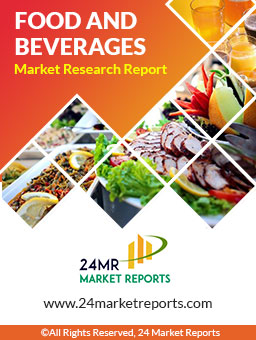
COMPANIES COVERED
ADM Animal NutritionDownload FREE Report Sample
Download Free sampleReport Overview:
Almost all the organic acids used in animal nutrition, such asformic, propionic, lactic, acetic, sorbic or citric acidshave an aliphatic structure and represent a source of energy for the cells. Benzoic acid, instead, is built on an aromatic ring and has different metabolic and absorption characteristics.The main mode of action of organic acids is through their antimicrobial effects, the magnitude of which is dependent on the chemical properties of the individual acid or acid salt. Dietary organic acids act as antimicrobials in the feed and thus improve the feed?s hygienic quality.
Organic acids are capable to reduce pH in feed. In addition, organic acids have the ability to cross the cell membranes of bacteria. And once inside the cell they will dissociate and disturb metabolism.
As a result, proliferation of the bacteria is reduced, resulting in lower pathogen counts in the intestinal tract. With the combination of these two modes of action of organic acids, growth of pathogenic bacteria in the feed can be reduced, therefore reduces digestive disturbances in the intestinal tract.
Organic acids have been used in commercial compound feeds, mostly for feed preservation, and its application to diets for poultry and pigs.
The Global Animal Nutrition Organic Acids Market Size was estimated at USD 2194.63 million in 2023 and is projected to reach USD 2874.42 million by 2029, exhibiting a CAGR of 4.60% during the forecast period.
Animal Nutrition Organic Acids Market provides a deep insight into the global Animal Nutrition Organic Acids market covering all its essential aspects. This ranges from a macro overview of the market to micro details of the market size, competitive landscape, development trend, niche market, key market drivers and challenges, SWOT analysis, Porter?s five forces analysis, value chain analysis, etc.
The analysis helps the reader to shape the competition within the industries and strategies for the competitive environment to enhance the potential profit. Furthermore, it provides a simple framework for evaluating and accessing the position of the business organization. The report structure also focuses on the competitive landscape of the Global Animal Nutrition Organic Acids Market, Animal Nutrition Organic Acids Market introduces in detail the market share, market performance, product situation, operation situation, etc. of the main players, which helps the readers in the industry to identify the main competitors and deeply understand the competition pattern of the market.
In a word, Animal Nutrition Organic Acids Market is a must-read for industry players, investors, researchers, consultants, business strategists, and all those who have any kind of stake or are planning to foray into the Animal Nutrition Organic Acids market in any manner.
Global Animal Nutrition Organic Acids Market: Market Segmentation Analysis
The research report includes specific segments by region (country), manufacturers, Type, and Application. Market segmentation creates subsets of a market based on product type, end-user or application, Geographic, and other factors. By understanding the market segments, the decision-maker can leverage this targeting in the product, sales, and marketing strategies. Market segments can power your product development cycles by informing how you create product offerings for different segments.
Key Company
ADM Animal Nutrition
Croda International
Cargill
Eastman Chemical Company
BASF Nutrition
Dow
ZAGRO
All About Feed
Perstorp AB
Bioergex
Market Segmentation (by Type)
Benzoic Acid
Butyric Acid
Sorbic Acid
Myristic Acid
Fumaric Acid
Malic Acid
Lactic Acid
Other
Market Segmentation (by Application)
Gut Health
Antimicrobial Capacity
Yield / Growth Promoter
Others
Geographic Segmentation
? North America (USA, Canada, Mexico)
? Europe (Germany, UK, France, Russia, Italy, Rest of Europe)
? Asia-Pacific (China, Japan, South Korea, India, Southeast Asia, Rest of Asia-Pacific)
? South America (Brazil, Argentina, Columbia, Rest of South America)
? The Middle East and Africa (Saudi Arabia, UAE, Egypt, Nigeria, South Africa, Rest of MEA)
Key Benefits of This Market Research:
? Industry drivers, restraints, and opportunities covered in the study
? Neutral perspective on the market performance
? Recent industry trends and developments
? Competitive landscape & strategies of key players
? Potential & niche segments and regions exhibiting promising growth covered
? Historical, current, and projected market size, in terms of value
? In-depth analysis of the Animal Nutrition Organic Acids Market
? Overview of the regional outlook of the Animal Nutrition Organic Acids Market:
Key Reasons to Buy this Report:
? Access to date statistics compiled by our researchers. These provide you with historical and forecast data, which is analyzed to tell you why your market is set to change
? This enables you to anticipate market changes to remain ahead of your competitors
? You will be able to copy data from the Excel spreadsheet straight into your marketing plans, business presentations, or other strategic documents
? The concise analysis, clear graph, and table format will enable you to pinpoint the information you require quickly
? Provision of market value (USD Billion) data for each segment and sub-segment
? Indicates the region and segment that is expected to witness the fastest growth as well as to dominate the market
? Analysis by geography highlighting the consumption of the product/service in the region as well as indicating the factors that are affecting the market within each region
? Competitive landscape which incorporates the market ranking of the major players, along with new service/product launches, partnerships, business expansions, and acquisitions in the past five years of companies profiled
? Extensive company profiles comprising of company overview, company insights, product benchmarking, and SWOT analysis for the major market players
? The current as well as the future market outlook of the industry concerning recent developments which involve growth opportunities and drivers as well as challenges and restraints of both emerging as well as developed regions
? Includes in-depth analysis of the market from various perspectives through Porter?s five forces analysis
? Provides insight into the market through Value Chain
? Market dynamics scenario, along with growth opportunities of the market in the years to come
? 6-month post-sales analyst support
Customization of the Report
In case of any queries or customization requirements, please connect with our sales team, who will ensure that your requirements are met.
Note: Animal Nutrition Organic Acids Market may need to undergo a final check or review and this could take about 48 hours.
Chapter Outline
Chapter 1 mainly introduces the statistical scope of the report, market division standards, and market research methods.
Chapter 2 is an executive summary of different market segments (by region, product type, application, etc), including the market size of each market segment, future development potential, and so on. It offers a high-level view of the current state of the Animal Nutrition Organic Acids Market and its likely evolution in the short to mid-term, and long term.
Chapter 3 makes a detailed analysis of the Market's Competitive Landscape of the market and provides the market share, capacity, output, price, latest development plan, merger, and acquisition information of the main manufacturers in the market.
Chapter 4 is the analysis of the whole market industrial chain, including the upstream and downstream of the industry, as well as Porter's five forces analysis.
Chapter 5 introduces the latest developments of the market, the driving factors and restrictive factors of the market, the challenges and risks faced by manufacturers in the industry, and the analysis of relevant policies in the industry.
Chapter 6 provides the analysis of various market segments according to product types, covering the market size and development potential of each market segment, to help readers find the blue ocean market in different market segments.
Chapter 7 provides the analysis of various market segments according to application, covering the market size and development potential of each market segment, to help readers find the blue ocean market in different downstream markets.
Chapter 8 provides a quantitative analysis of the market size and development potential of each region and its main countries and introduces the market development, future development prospects, market space, and capacity of each country in the world.
Chapter 9 introduces the basic situation of the main companies in the market in detail, including product sales revenue, sales volume, price, gross profit margin, market share, product introduction, recent development, etc.
Chapter 10 provides a quantitative analysis of the market size and development potential of each region in the next five years.
Chapter 11 provides a quantitative analysis of the market size and development potential of each market segment (product type and application) in the next five years.
Chapter 12 is the main points and conclusions of the report.

Speak to our Custom Research Team and get the Custom Research in a budget
Custom ResearchFrequently Asked Questions ?
A license granted to one user. Rules or conditions might be applied for e.g. the use of electric files (PDFs) or printings, depending on product.
A license granted to multiple users.
A license granted to a single business site/establishment.
A license granted to all employees within organisation access to the product.
Upto Working 24 to 48 hrs
Upto 72 hrs max - Weekends and Public Holidays
Online Payments with PayPal and CCavenue
Wire Transfer/Bank Transfer
Hard Copy



 Industry Market Size
Industry Market Size SWOT Analysis
SWOT Analysis Industry Major Players
Industry Major Players Revenue Forecasts
Revenue Forecasts Historical and Forecast Growth
Historical and Forecast Growth Profitability Analysis
Profitability Analysis
























